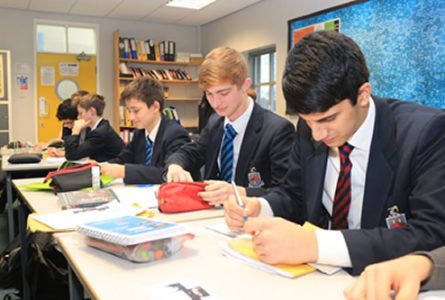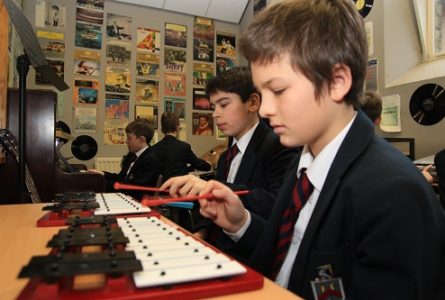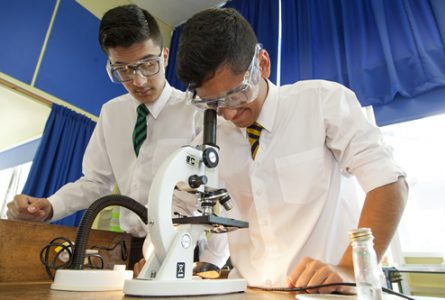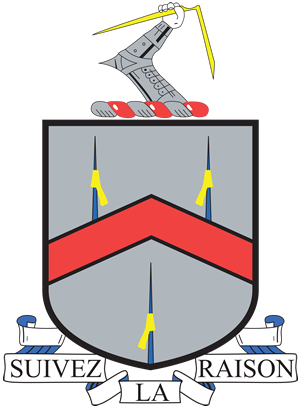


More information on the School curriculum can be found in the Curriculum Policy.
Key Stage 3
Pupils in Years 7 and 8 are placed into four forms of mixed ability. All pupils follow the same extensive programme of study in Mathematics, English, Biology, Chemistry, Computing, Latin, French, German, Art, History, Geography, Design Technology, Music, Religious Studies, Physics, PSHCE and Physical Education; thereby, going far beyond the statutory National Curriculum. Details of the content of the KS3 courses can be found in the KS3 Curriculum Information Booklet. You can download curriculum overviews for Year 7 and Year 8 below.
Key Stage 4
Classes are set by ability in mathematics but are mixed ability everywhere else. All pupils follow a compulsory programme of GCSEs in Mathematics, English Language, English Literature, Biology, Chemistry and Physics. A small number are entered for Core and Additional Science rather than the separate sciences.
All pupils choose further GCSE options from a list. The School is currently transitioning to a new curriculum structure; therefore, pupils entering
• Year 9 and 10 in September 2020, will follow ten GCSE courses over three years by selecting four optional subjects, which must include a language (French, German or Latin) and a humanities (Geography or History). You can download curriculum overviews for Year 9 and Year 10 below.
• Year 11 in September 2020, will continue into the second and final year of their nine GCSE programme.
The range of optional GCSE courses on offer varies each year. Typically, pupils select from a list that includes Art and Design, Computer Science, Design and Technology, Food & Nutrition, French, Geography, German, History, Latin, Music, Physical Education and Religious Studies. Details of the content of the KS4 courses can be found in the GCSE Options Booklet. Subject preferences should be recorded on a GCSE Options Form.
If an insufficient number of pupils choose a subject for it to be viable, the School may decide to withdraw the course; if too many pupils apply for a course, the over-subscription criteria will be made clear to those affected. Due to timetabling restrictions, not all subject combinations are possible.
In 2020-21, KS4 pupils will follow compulsory non-examined courses from a list including Art, Careers, Classics, Computing, Drama, Ecology, Economics, Italian, Law, Music, PSHCE, Physical Education and Religious Education.
External examinations are taken at the end of Year 11.
Where possible, support sessions are provided by subject areas in addition to lessons.
Key Stage 5
On entry, pupils select three subjects to follow at A Level; for pupils with sufficiently high prior attainment at GCSE (i.e. an average points score of 7.0 or higher where A* = 8.5, A = 7, B = 5.5, C = 4 and reformed GCSE points awarded as per grade), a fourth A Level subject can be added.
The range of A Level courses on offer varies each year, but typically pupils select from a list that includes: Art and Design, Biology, Chemistry, Classical Civilisation, Computer Science, Design Engineering, Economics, English Language, English Literature, French, Further Mathematics, Geography, German, Politics, Product Design, History, Latin, Mathematics, Music, Physical Education, Physics, and Philosophy & Ethics. Some of these courses are run off-site, in collaboration with Skipton Girls’ High School. Details of the content of the KS5 courses can be found in the KS5 Curriculum Information Booklet.
If an insufficient number of pupils choose a subject for it to be viable, the School may decide to withdraw the course; if too many pupils apply for a course, the over-subscription criteria will be made clear to those affected. Due to timetabling restrictions, not all subject combinations are possible.
There is an even stronger emphasis at this stage on scholarship and on pupils developing independent study and research into areas of personal interest. A significant number of Sixth Form pupils pursue this through the Extended Project Qualification.
A Level work is supplemented by a Lecture Programme that offers distinguished visiting speakers the opportunity to present significant issues for question and discussion. There are also compulsory non-examined courses in PSHCE and an enrichment programme that includes careers and preparation for higher education. Physical Education is part of the compulsory curriculum in the Sixth Form unless pupils are excused on medical grounds. Sixth Form pupils may alternatively opt to participate in the volunteering programme.
External examinations are taken at the end of Year 13.
